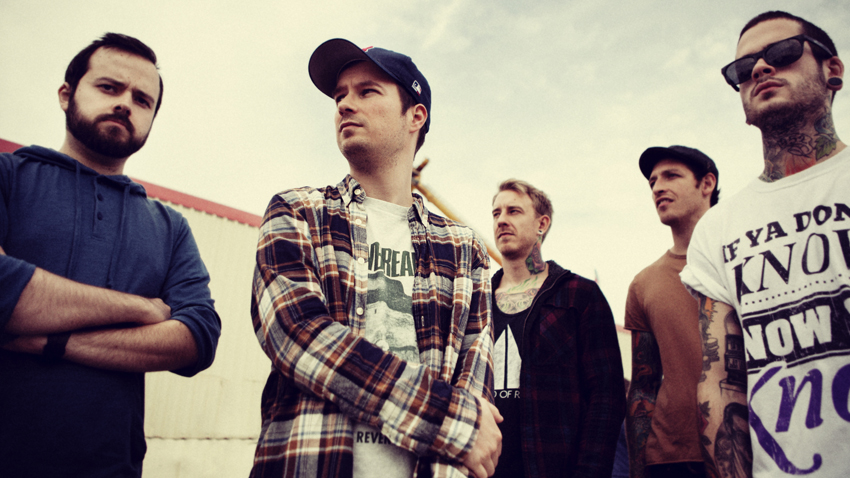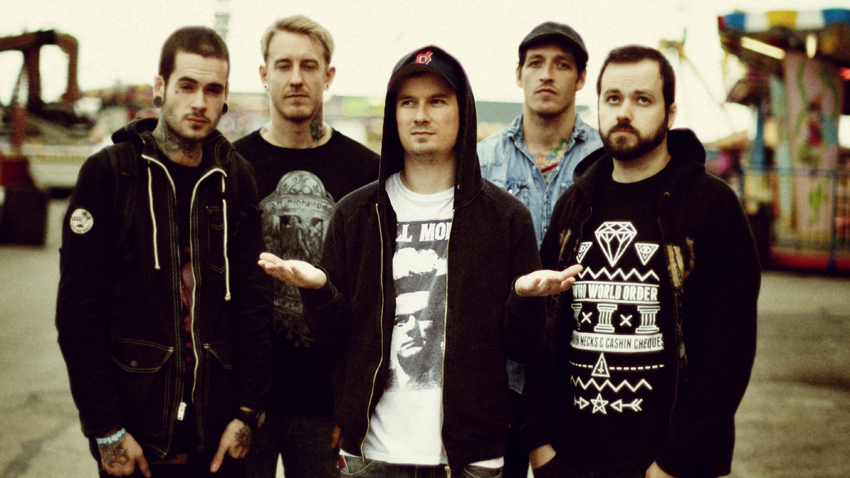Funeral For A Friend talk Conduit, finding their edge and shirking lead duties
Kris Coombs-Roberts on their thrilling new full-length

Want all the hottest music and gear news, reviews, deals, features and more, direct to your inbox? Sign up here.
You are now subscribed
Your newsletter sign-up was successful
Funeral For A Friend celebrate the tenth anniversary of their game-changing debut this year and considering that only two of the group's original line-up remain - guitarist/songwriter Kris Coombs-Roberts and vocalist Matthew Davies-Kreye - you'd be forgiven for thinking that their best records are behind them.
You'd also be wrong. Conduit, their sixth studio album, is quite possibly the Welsh post-hardcore band's most important record since their 2003 debut Casually Dressed And Deep In Conversation.
Aided no doubt by the arrival of powerhouse drummer Pat Lundy (previously of Rise To Remain), Funeral's sixth album is a turning point and also their heaviest effort to date, full of groove-laden, hardcore riffing, metal precision and true-to-the-cause reaffirmation of their punk roots.
We spoke to guitarist Kris Coombs-Roberts about the Conduit sessions, his world-beating PRS and why one of UK heavy music's most technically accomplished guitarists hates playing lead.
What would you say has been the defining influence on the sound of Conduit?
"It's quite simple, to be honest with you: with this record, we took time out and it's allowed us to look back at things and think about what it is that we wanted to achieve. It's felt in the past, maybe, like, 'There's a deadline. Get it out.'
"I'm proud of everything we've done, but I feel that maybe somewhere along there we lost our sense of direction, who we are as a band, and maybe lost our identity a little bit... When you fire out a lot of records very quickly, maybe in the rush of it all, you lose sight of why you started playing music, why you wanted to be in a band and why you wanted to tour and record."
It seems that on Conduit that by not trying to force a progression in your sound, it's grown and changed direction naturally...
Want all the hottest music and gear news, reviews, deals, features and more, direct to your inbox? Sign up here.
"I suppose the thing with this record was trying to remember how we felt when we first started writing music. I can remember playing songs [back then] and it was all about how they felt when you played them live and that's one of the things we really tried to get back into our songs - that live energy and intensity. For me, it definitely comes through."

Funeral For A Friend: wary of rain
Was their any discussion in the band about Conduit's heavier direction?
"No, we just dove straight in! I think it started when we did High Castles for the See You All In Hell EP. The reason that we also included that on Conduit is that it was the catalyst for the whole album. When we wrote the track, we were aiming to write a new song to go with the B-sides EP and we didn't really think about it, but when we'd finished the track we were all like, 'Woh! That actually sounds more like 'us' than we have in years!' We didn't force it, we didn't push it - we just started writing."
Tracks like High Castles and Conduit feature some of your most metal guitar work yet. How did you draw that side of your playing out?
"I think with, Conduit, for instance, it's almost a more thrashy, Scandinavian metal type thing that jumps into a kind of hardcore feel. It wasn't done purposefully, but I suppose because they're two bands that I love that it's like crossing The Haunted with Vision Of Disorder. I love the technical aspects of metal playing, especially bands like The Haunted and At The Gates, where they're very melodic riffs, but rhythmically very technical. Then the other side of that is the straight-forward slidey, hardcore feel."
Don't take this the wrong way, but what makes the album is that you're playing less lead, so the rhythm sections are noticeably punchier. Was that intentional?
"Yeah! I absolutely hate playing lead! I suppose I kind of went back on my word to a degree when we did [last album, 2011's] Welcome Home Armageddon, because I always said I'd never play a guitar solo, and then we put one in Broken Foundation. For me, a song's really gotta need it. If I do write leads, I'd rather they're integrated into the track with the vocals on on top of them. Ultimately, that's the most important part of the song: the vocals and the feel. The music gives it the energy and the vocals give it the emotion."
Check out the video for Best Friends And Hospital Beds
How did you go about achieving those punishing guitar tones?
"We're mainly running a Bogner Uberschall and a Peavey 6505+ simultaneously. The gain was coming from the 6505 and then we rolled back the gain on the Uberschall to give more of a crunch and tighten everything up. I use the 6505 live, for me they're the most consistent amps in the world - every single one of them sounds the same. They're brilliant made, whereas with a lot of other amps you have a good one or a bad one."
"I like tones to have a natural sound quality to them. That's the thing that Ramesh [Dodangoda, producer] has done very well with this record. It's got a very natural guitar tone. We used a lot of different amps - Marshall, Orange, Blackstars - so it's quite weird that the guitar tone sounds so stripped-back and earthy, because there's a lot of different amps going on there."
What was your main guitar on the album? Do you still use a PRS?
"I've got a white PRS Singlecut that I've had for coming on eight years now. At the time that I got it, PRS didn't make white Singlecuts, so they refinished a blue one for me. For some reason that guitar sounds head and shoulders better than any other guitar I've ever owned or played. We also used a Fender Telecaster, a Gibson Les Paul and [Japanese brand] Nil Monstage for some of the lead work. 90% of the tracking was done with that white PRS, though. We had 16/17 guitars in the studio and it just absolutely destroyed every single one of them."
Do you think you might look back on Conduit as a turning point for the band?
"Definitely, I think this is the most excited as a band that we've been for a while. And what with the line-up changes, as well... It's our first proper tour with Pat [Lundy, drums] and that's obviously very exciting because he's an absolutely phenomenal drummer - he's ridiculous. I've done a lot of touring and played with a lot of drummers, but he's something else. He really is a machine."
Has Pat's arrival helped to re-energise the band?
"I think so, when he came in and did his drums, the album became 'more' than any of us had anticipated it to be. I think it took the energy of the record to a different level again. Rich [Boucher] as well. He's a bassist's bassist. He loves his instrument. When I'm at home, I sit down and play FIFA, but I have no doubt that he's sat in house right now trying to learn something mental to come and show us!
"That's another thing that pushes us all - that healthy competition. When someone else learns something, it's like: 'I've got to learn to do that and I've got to learn to do it better!'"
Conduit is available for pre-order now, with the accompanying tour starting in Bristol tonight. Check out Funeral For A Friend's official website for more details.
Matt is a freelance journalist who has spent the last decade interviewing musicians for the likes of Total Guitar, Guitarist, Guitar World, MusicRadar, NME.com, DJ Mag and Electronic Sound. In 2020, he launched CreativeMoney.co.uk, which aims to share the ideas that make creative lifestyles more sustainable. He plays guitar, but should not be allowed near your delay pedals.
